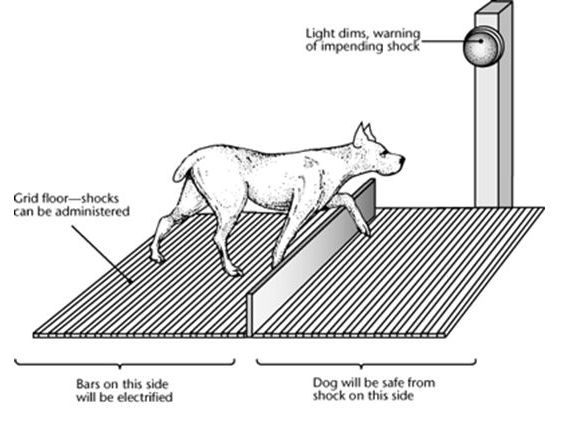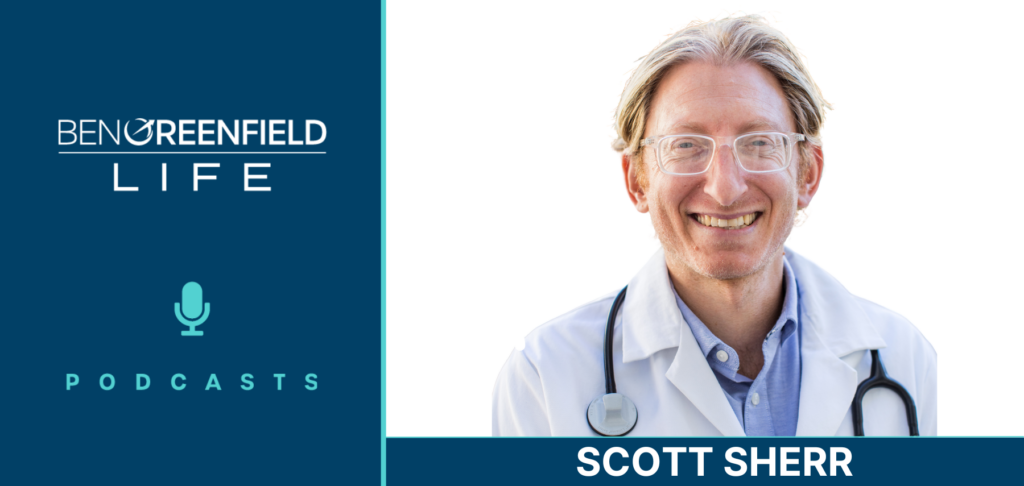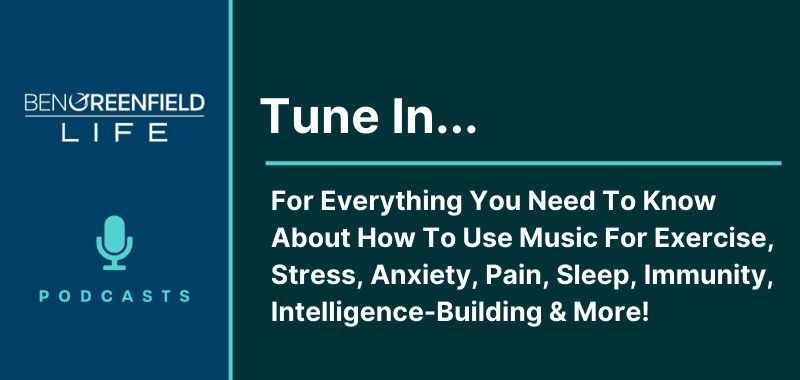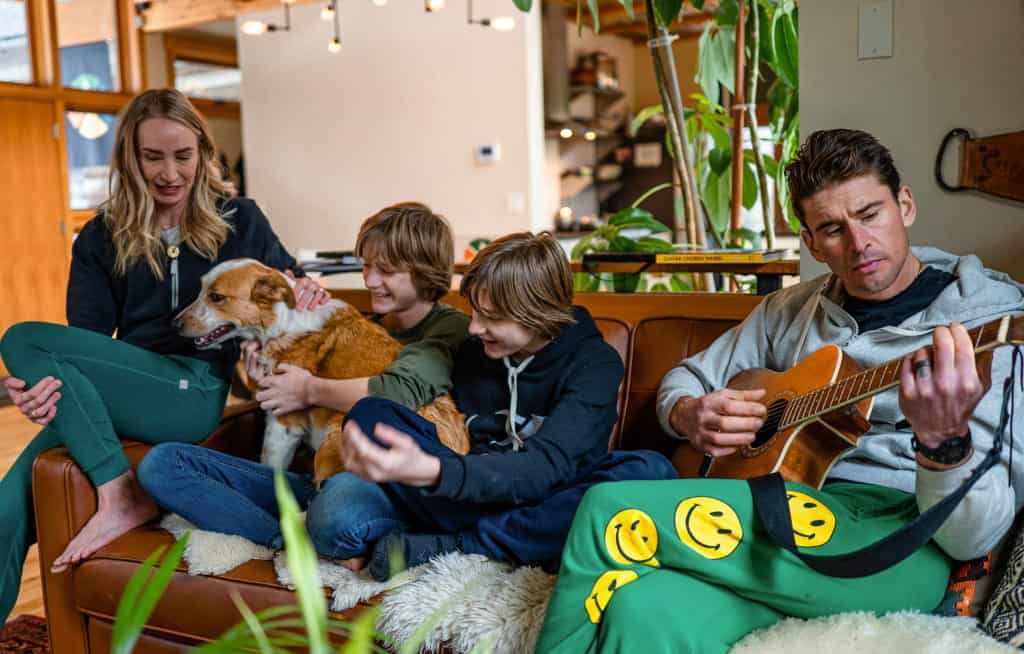August 23, 2020
Ah, how complex is the ever-evolving science of self-quantification!
In a past Sabbath Rambling, I tackled the world of wearables—and the importance of knowing how to unplug from our rings, wristbands, ankle bracelets, chips, watches, and miniature body computers to instead listen to the oh-so-subtle cues from our body and it's innate intelligence.
But beyond these computerized devices is an entirely different realm: that softer science of blood and biomarker testing. I've exhaustively tackled this topic in the past in posts such as this and podcasts such as this, highlighting the importance—should you be concerned about your overall health and longevity—of tracking variables such as inflammation, glycemic variability, hormones, lipids, ketones, genes, the microbiome, and more.
Yet, of all the varying and ever-expanding forms of self-quantification that exist, there is one single asset you can possess that is far more crucial to your overall health and longevity than your HDL, your testosterone, your ketone levels, your step count, your grip strength, or any other quantifiable variable…
…hope.
The Importance Of Hope
In secular psychology, hope is defined as a motivation to persevere toward a goal or end state, even when you may be skeptical that a positive outcome is likely.
It often involves proactive progress toward a goal, a can-do attitude, and a belief that you have some kind of achievable pathway to a desired outcome.
But as a Christian, I tend to lean towards liking pastor and author John Piper's definition of hope just a bit better than that above. Piper says…
…“Hope is a heartfelt, joyful conviction that our short-term future is governed by an all-caring God, and our long-term future, beyond death, will be happy beyond imagination in the presence of the all-satisfying glory of God.”
Within the pages of my book, Boundless, I explore this concept of how much more meaningful (and hopeful!) life can be when we believe that our story has a great Author, rather than believing that everything we see and experience is meaningless and without purpose, or that we are simply a bunch of chunks of spiritless flesh and blood floating through space on a giant rock, then eventually dying and passing away into nothingness.
It turns out that, very similar to what we know about the human science of gratitude, and what we know about the power of having a purpose statement in life, the physical and psychological impact of the emotion of hope is also quite impressive.
For example, one study from Harvard’s “Human Flourishing Program” examined the impact of hope on nearly 13,000 people and found those with more hope in their lives had superior physical health, better overall health behaviors, increased social support, and a longer life—along with fewer chronic health problems, less depression and anxiety, and a lower risk of cancer. Long-term studies of employee well-being suggest that hopeful employees experience more well-being, and in one Gallup poll of 1 million students, those who were more hopeful laughed and smiled much more often than the hopeless, and also engaged in healthier behaviors, including fruit and vegetable consumption, regular exercise, safer sex practices, and less smoking. In his book, The Anatomy Of Hope, Dr. Jerome Groopman, Professor and Chairman of the Department of Medicine at Harvard Medical School, tells extraordinary stories of hope in coping with conventionally hopeless diseases and suffering. He demonstrates that on a biological level, hope may stimulate the release of internal painkiller molecules.
Hope not only changes us physically, but also psychologically. Hope empowers us to endure greater amounts of suffering. In a time of crisis or survival, even a small glimpse of hope can infuse greater endurance and strength into our circumstances. It produces opportunity and proactiveness, because when you live with the expectation that positive changes are on the horizon, you can open yourself up to a world of new possibilities, fueled by confidence that a new way of life is possible rather than being paralyzed by fear of an unknown, dark and scary future. Hope brings forth purpose and vision, infuses joy and happiness, and gives us a glimpse in our weary lives that, as the famous Christmas song O Holy Night goes, yonder breaks a new and glorious morn:
“Long lay the world in sin and error pining,
Till He appear’d and the soul felt its worth.
A thrill of hope, the weary world rejoices,
For yonder breaks a new and glorious morn.”
— O Holy Night
One could argue that the opposite of hope is helplessness. For example, in a series of 1965 experiments that you're likely familiar with, researcher Martin Seligman discovered learned helplessness when he observed that animals subjected to difficult situations they cannot control will stop trying to escape, and instead become submissive and passive. Here's an illustration of one such example of dogs in an electrified cage:
- Dogs are in an electrified cage at first not able to escape the impending shock.
- Later, all they had to do was cross to the other side to escape the shock, but they didn't even try.
- The dogs had learned they were “helpless” to avoid the shock and just sat there and took it without trying to escape.
Human beings are the same. If we experience devastating defeats, a persistent situation that we can't change, or a terrifying event that we cannot control our exposure to, we can often lose hope for our ability to change this painful situation. Apathy sets in. We don't try to get a job, make friends, eat healthier, leave a partner who may be abusive, or engage in other efforts to proactively make life better. We tend to see any efforts to change our life as largely futile. We accept whatever happens as beyond our control. We begin to despair.
After all, why bother? It won't really make a difference. We don't want to risk the pain of further disappointment by even trying. Unfortunately, this despair and resignation can become a self-fulfilling negative cycle. If you have no hope that any action you take will make any difference, then that often very well is the actual outcome.
So let me ask you, which would you rather have: hope or helplessness?
How To Hope
Now that you understand the immense importance of waking up each day with not only a strong sense of purpose and gratitude, but also a deep sense of hope, how can you best tap into this powerful emotion?
Here are a few good tips for discovering more hope, particularly when you're in a bit of a funk or feeling down:
-Consider all the amazing things you’ve done in your life. In other words, remember past positive experiences, which I would consider to tie closely to a daily practice of gratitude, or at least to be far easier when you're able to crack open the pages of a gratitude journal and see what you've written on previous days.
-Surround yourself with optimism. Try to hang out with people who persistently see the bright side of things and the sunny side of every situation—who always have a smile and a positive attitude.
-Surround yourself with inspiration. Pipe uplifting music into your home, allow sun to constantly be seeping in through the windows, engage in exposure to fresh air and nature immersion, seep yourself with aromatherapy via uplifting scents such as peppermint, rose, or cinnamon; and surround yourself with inspirational memes, quotes, and artwork on your walls and screensavers. You'd be surprised at how simple environmental tweaks can produce a near-instant positive impact on mode.
-Write down a plan. If there are changes that need to be made in your life, such as a new workout plan to get through an injury, a new weekly schedule to free up time for a project you've been neglecting, or a book-reading schedule to get through a new series you've been wanting to read, then you must understand that being able to see how the steps you are taking will lead to desired change is critical to producing hope. Write down each step that you need to take to get where you want to be.
-Check out Project Hope Exchange. This is a website where people record their experiences of overcoming adversity, and there is a special section for mental health challenges and life challenges. It turns out there are many people who have overcome tremendous adversity. Reading their stories and surrounding yourself with the supportive messages you'll find there can help you build hope.
-Take every step you can. Do what you know you can do. When you are in despair, taking one tiny step forward can help break any sense of hopelessness you may have. Feeling depressed or hopeless about the day? Make your bed. Cook breakfast. Meditate for five minutes. Call a friend. Take the small steps you know you can take. One common piece of wisdom in wilderness survival, and a common trait in those who survive through very difficult survival conditions, is that they are constantly taking tiny steps to make their situation just a little bit better—no matter how small those steps may be.
-Help others. Performing acts of kindness can have a dramatic effect on your mood and outlook. Kindness triggers the release of serotonin, so it can produce an anti-depressant effect; and, similar to what you'll experience with a gratitude practice, an increased sense of empathy in your own life can help to calm stress, reduce pain and increase hope.
-Finally, the biggest tip that I can give you for finding hope is to embrace faith and to engage with a religious or spiritual community. Since the dawn of time, it has repeatedly been shown that when surrounded by a community of like-minded and supportive believers, people have drawn strength, found peace, and experienced an overall elevation of positive well being, fueled by the hope of knowing there is something or someone much larger than them, watching over and protecting them along each step of life's winding path.
While many would scoff at the belief that there are gods and demons, spirits and angels, and even one single almighty Creator of the planet, research has indeed shown a connection between longevity and faith. One study entitled “Church Attendance, Allostatic Load and Mortality in Middle-Aged Adults” analyzed the relationship between religious practice, stress, and death in middle age, and controlled for socioeconomic factors, health insurance status, and healthy lifestyle behaviors. The researchers found that churchgoers have a significantly lower risk of dying, and after adjusting for age, sex, race, and chronic medical conditions, churchgoers were 46% less likely to die in the follow-up period after the study compared to non-churchgoers. Non-churchgoers had significantly higher rates of blood pressure and a higher ratio of total cholesterol to HDL cholesterol, along with a significantly higher mortality rate.
It turns out that data from The Blue Zones—areas with a disproportionately high number of healthy, so-called “centenarians”—backs this up. All but five of the 263 centenarians Buettner interviewed for the book belonged to some faith-based community. Research also shows that attending faith-based services four times per month can add four to fourteen years of life expectancy. In all Blue Zones, centenarians were part of a religious community. I can’t sum it up any better than Buettner, who concluded that:
“People who pay attention to their spiritual side have lower rates of cardiovascular disease, depression, stress, and suicide, and their immune systems seem to work better … To a certain extent, adherence to a religion allows them to relinquish the stresses of everyday life to a higher power.”
In the Bible, which is of course a perfect example of a highly valued source of absolute truth for many faith-based communities, 1 Peter 5:7 recommends us to “cast all our cares upon Him.” Being able to “cast my cares” and to be able to trust in and talk to a higher power, buttressed by the support and encouragement of others who are also believers, is certainly something that has given me personally a great deal of hope, confidence, clarity, peace, and direction in life. When it comes to your own health, I am convinced that a religious practice that includes spiritual disciplines such as fasting, meditation, prayer, silence, solitude, worship, and study is magnitudes more meaningful and impactful than a salad of wild plants, a glass of organic wine, or a dose of sunshine.
Of course, this entire faith, healing, and hope trilogy is all supported to the underlying science behind the biology of belief and impact of emotional state on your flesh and bones that I taught you about in this article. To discover this hope, visit the Hero's Journey and begin to understand the vast significance of being able to, without any sense of shame or judgment, cast every last care and both the lightest and heaviest of burdens upon Him. John Piper describes this flavor of hope as a “vibrant, living, unshakable, blood-bought hope that is the defining motion of the Christian heart and gives rise to joyful fearlessness in the face of human trouble and threats.”
When you discover a hope that epic in your life, and it's planted like a flourishing, fragrant flower within the garden of your heart, you'll find that every other form of self-quantification pales in terms of being able to “predict” your health and lifespan. Nothing is more important.
Furthermore, if you have already discovered that hope, and you wish to share a defense for the hope that is within you, then I recommend that you read the book Always Ready: Directions for Defending the Faith by Greg Bahnsen. This book is an excellent compilation of several of Dr. Bahnsen's published works on Christian apologetics, including his Apologetics syllabus, articles on practical apologetic problems like the problem of evil, the problem of miracles, etc. It will allow you to better share your hope with others who have yet to discover the intense meaning in life derived from a strong sense of hope, and to fulfill the words of 1 Peter 3:15 in the Bible…
…”Always be prepared to give an answer to everyone who asks you to give the reason for the hope that you have.”
How about you? Do you have hope in your life? If so, how do you fuel the fire of hope that is within you? Are you able to share an answer to others about the source of the hope that is within you? Share your own perspectives on hope in the comments section below, along with any other questions or thoughts that you have. I read it all!














Ben,
Amen Brother! Thanks for the message on Hope, something we all need in 2020. It is part of the big 3 in scripture of Faith, Hope and Love. Also thanks for including quotes from John Piper, he is a great modern day preacher and author. Hope to see you a another Spartan Race in 2021 and you can finally get that leg compression!
How to have hope?
If you have the T allele of SNP rs6265 hope will come easier to you. The T allele of this SNP which will give you “Protection against depression when subjected to repeated defeat”. That’s what hope is… No?
You can find more info about that SNP here: https://selfdecode.com/snp/rs6265/
Cheers,
Ivo
Ben,
As an evangelical Christian, I am thankful that you are sharing your faith in the health and wellness space. There tends to be an idolatry of physical health, as well as a lot of New Age superstition, so thank you for your boldness and clarity. And thank you for mentioning Greg Bahnsen, the greatest Christian apologist and philosopher of our time in my opinion. May God use your writings to lead many lost sheep to Christ!
Well Written, let’s Hope and be Grateful !!
Brother, you really knocked it out of the park – again. Too much I’d like to share and too little time to do justice to your powerful message, so will just leave it at “Bravo!!!” – Your grateful and HOPE-filled friend, Randy Haacke
Ben, I have been so blessed and encouraged by your writings, and your love for the Lord God. Please don’t take this as a criticism, but I don’t understand the use of the f word. God created sex as a beautiful act of love, but when I see that word even the one letter like above it is painful. To me it portrays a vile use of what God made to be beautiful.
Even the Bible uses strong language when appropriate for dramatic emphasis…worth a read: http://www.evidenceunseen.com/bible-difficulties-…
I agree with this. As an Integrative health coach, I was considering purchasing Boundless, and potentially encouraging others to read it, but the title of that chapter turned me off. Catchy for mainstream audiences, but totally unnecessary, and offensive to enough people that I wouldn’t recommend it. That said, I love Bens blogs and the scientific content of his posts, podcasts, etc. I would wager even more people would be reached if more care was taken in regard to details like this….
Hi
I’ve seen a lot of serendipity lately and this is yet another blessing.
On Top of this my girlfriends name is Hope, and she is the one that turned me on the the Bible again. How am I not surprised with the timing of this article? Beautiful prose. Thank you , always, for your work Ben
Thank you, Ben. A Biblical hope is what this country (and the world) needs so desperately!
Thanks Ben – I needed this today!
Yes! It’s Sunday. In the midst of the pandemic, raging forest fires all around me, hearing so much negativity about our collective future, our political morass, etc … this message of HOPE is so necessary. Especially if all people could live and execute this premise of HOPE. I’m not religious in the conventional sense, seeing the division and strife it has caused, but I see a ‘God’ of this incredible infinite universe that gives me that essential HOPE and meaning for our existence. Thanks Ben for this essential message !
I sincerely look forward to every Sunday, not just because it is God’s day (which God is in each and everyone of us, so it is technically ours day for self care as well) but because of these sabbath ramblings.
God love you Ben for providing this free, accessible vital words for everyone in the world (wide web)!! Love you man. Can’t wait to meet you someday.
When I started to read your Sabbath Ramblings today, tears of realization came to my eyes. As a physician who practices functional and integrative medicine and dives deep into that quantifiable world, I realized after reading that I was missing hope from my life. I had moved away from my Christian roots over the years and your beautifully written piece today allowed me to see that all the degrees, Fellowships and bio hacks won’t fulfill unless there is a foundation of Hope. Thank you!
Funny how you tend to find me at the right time, like in 2013 during my first cancer diagnosis living in NY. I have always subscribed and referred to you as a most knowledgeable source and always been greatly rewarded with your deeply researched investigative podcasts.
I bought my Clearlight through you, then EMF, then my anti blue light…Reishi coffee… birth of Kion and so on.
so it makes sense that I would seek you out again, feeling slightly adrift during the pandemic with our three teenagers we moved to the sunshine and ocean knowing we would need it. Here again the advice is spot on and we can use this for our children who see the world around them and do feel powerless and need a strategy for hope. Thanks Ben , Jessica and what I am sure is a massive team of awesome 👏
Another outstanding Sabbath Musings article Ben. America needs HOPE. Thank you. Keep sharing about the One who gives HOPE: Jesus.
Thank you so much for writing this! It came at the perfect time and I definitely needed to read this message.
Thank you Ben. I always love your Sabbath Ramblings!
Wow, what a great piece of work, a masterpiece really! Not only do you give such valuable information but also you leave an impact on people. Like in me, if ever there is something wrong growing in my body. those things just evaporate into thin air after reading your work which is better than any medicine I can take. So hope you don’t mind me copying this article so I can read it again when something bad does come along.
Copy away! :)